Case Study: Ethical Analysis of Evidence-Based Nursing Education
VerifiedAdded on 2023/04/12
|6
|1284
|99
Case Study
AI Summary
This case study provides an in-depth analysis and ethical evaluation of a research article focusing on enhancing the utility and understanding of evidence-based practice (EBP) in undergraduate nursing education. It examines the study's problem and purpose statements, research questions, and hypothesis, while also identifying dependent and independent variables. The analysis covers the study's population, sampling method, data collection techniques, and data analysis methods, including statistical tests used. It summarizes the study's results, assumptions, and limitations, and critically evaluates potential ethical considerations related to sampling, data collection, analysis, and publication. The evaluation emphasizes the importance of ethical principles in health-based research, including informed consent, confidentiality, scientific validity, and conflict of interest mitigation. The case study also identifies the lack of a control group as a potential source of bias and suggests improvements for future research.
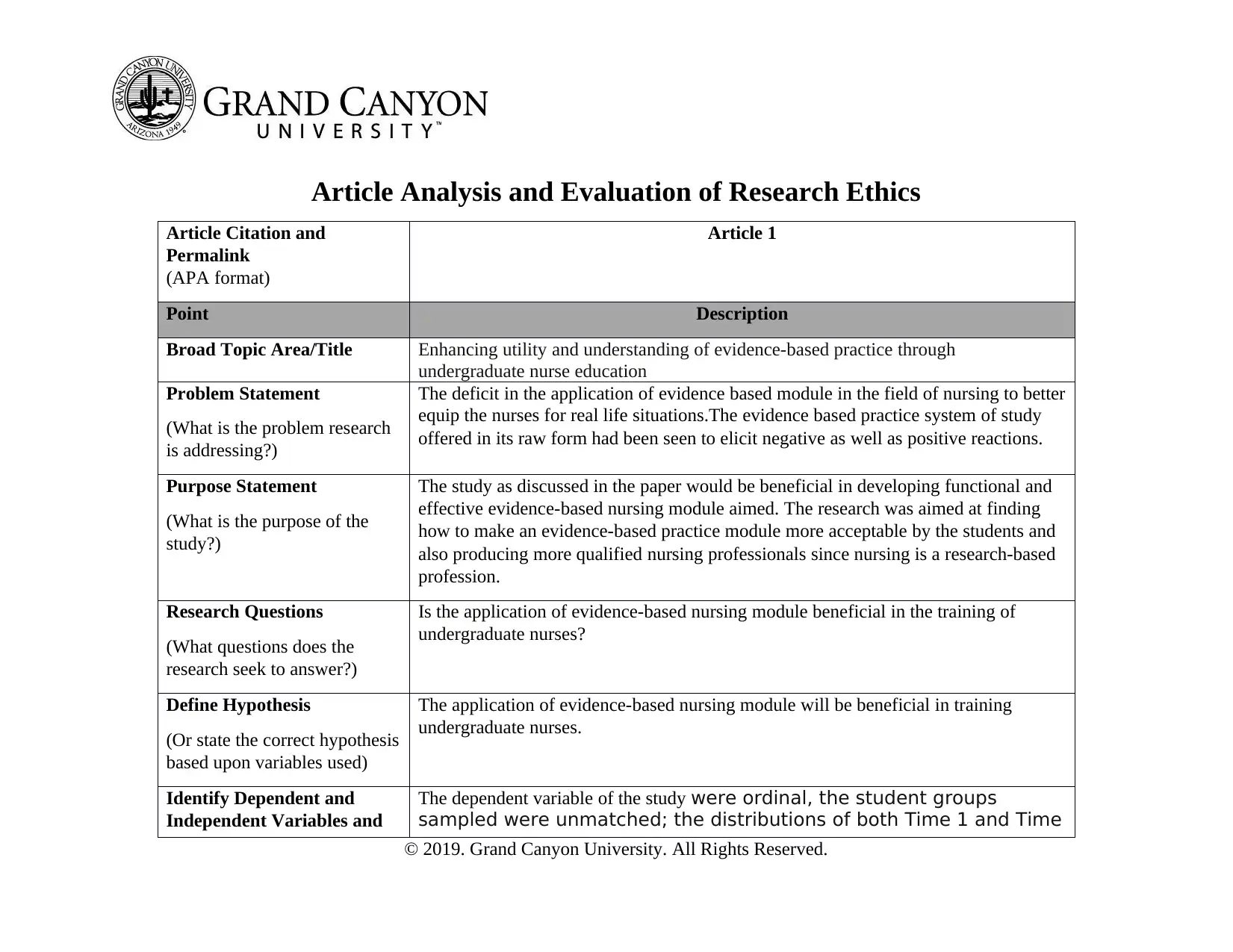
Article Analysis and Evaluation of Research Ethics
Article Citation and
Permalink
(APA format)
Article 1
Point Description
Broad Topic Area/Title Enhancing utility and understanding of evidence-based practice through
undergraduate nurse education
Problem Statement
(What is the problem research
is addressing?)
The deficit in the application of evidence based module in the field of nursing to better
equip the nurses for real life situations.The evidence based practice system of study
offered in its raw form had been seen to elicit negative as well as positive reactions.
Purpose Statement
(What is the purpose of the
study?)
The study as discussed in the paper would be beneficial in developing functional and
effective evidence-based nursing module aimed. The research was aimed at finding
how to make an evidence-based practice module more acceptable by the students and
also producing more qualified nursing professionals since nursing is a research-based
profession.
Research Questions
(What questions does the
research seek to answer?)
Is the application of evidence-based nursing module beneficial in the training of
undergraduate nurses?
Define Hypothesis
(Or state the correct hypothesis
based upon variables used)
The application of evidence-based nursing module will be beneficial in training
undergraduate nurses.
Identify Dependent and
Independent Variables and
The dependent variable of the study were ordinal, the student groups
sampled were unmatched; the distributions of both Time 1 and Time
© 2019. Grand Canyon University. All Rights Reserved.
Article Citation and
Permalink
(APA format)
Article 1
Point Description
Broad Topic Area/Title Enhancing utility and understanding of evidence-based practice through
undergraduate nurse education
Problem Statement
(What is the problem research
is addressing?)
The deficit in the application of evidence based module in the field of nursing to better
equip the nurses for real life situations.The evidence based practice system of study
offered in its raw form had been seen to elicit negative as well as positive reactions.
Purpose Statement
(What is the purpose of the
study?)
The study as discussed in the paper would be beneficial in developing functional and
effective evidence-based nursing module aimed. The research was aimed at finding
how to make an evidence-based practice module more acceptable by the students and
also producing more qualified nursing professionals since nursing is a research-based
profession.
Research Questions
(What questions does the
research seek to answer?)
Is the application of evidence-based nursing module beneficial in the training of
undergraduate nurses?
Define Hypothesis
(Or state the correct hypothesis
based upon variables used)
The application of evidence-based nursing module will be beneficial in training
undergraduate nurses.
Identify Dependent and
Independent Variables and
The dependent variable of the study were ordinal, the student groups
sampled were unmatched; the distributions of both Time 1 and Time
© 2019. Grand Canyon University. All Rights Reserved.
Paraphrase This Document
Need a fresh take? Get an instant paraphrase of this document with our AI Paraphraser
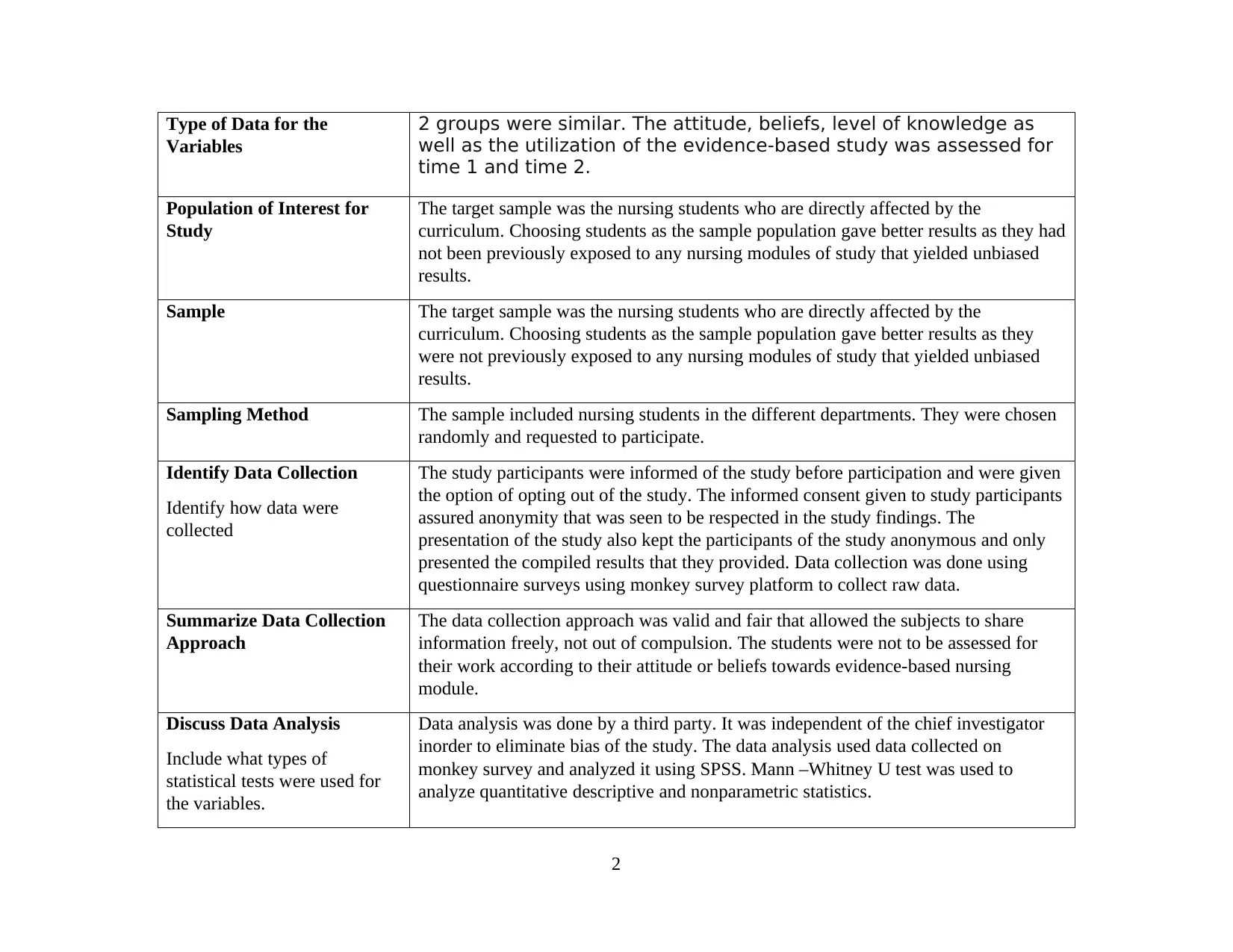
Type of Data for the
Variables
2 groups were similar. The attitude, beliefs, level of knowledge as
well as the utilization of the evidence-based study was assessed for
time 1 and time 2.
Population of Interest for
Study
The target sample was the nursing students who are directly affected by the
curriculum. Choosing students as the sample population gave better results as they had
not been previously exposed to any nursing modules of study that yielded unbiased
results.
Sample The target sample was the nursing students who are directly affected by the
curriculum. Choosing students as the sample population gave better results as they
were not previously exposed to any nursing modules of study that yielded unbiased
results.
Sampling Method The sample included nursing students in the different departments. They were chosen
randomly and requested to participate.
Identify Data Collection
Identify how data were
collected
The study participants were informed of the study before participation and were given
the option of opting out of the study. The informed consent given to study participants
assured anonymity that was seen to be respected in the study findings. The
presentation of the study also kept the participants of the study anonymous and only
presented the compiled results that they provided. Data collection was done using
questionnaire surveys using monkey survey platform to collect raw data.
Summarize Data Collection
Approach
The data collection approach was valid and fair that allowed the subjects to share
information freely, not out of compulsion. The students were not to be assessed for
their work according to their attitude or beliefs towards evidence-based nursing
module.
Discuss Data Analysis
Include what types of
statistical tests were used for
the variables.
Data analysis was done by a third party. It was independent of the chief investigator
inorder to eliminate bias of the study. The data analysis used data collected on
monkey survey and analyzed it using SPSS. Mann –Whitney U test was used to
analyze quantitative descriptive and nonparametric statistics.
2
Variables
2 groups were similar. The attitude, beliefs, level of knowledge as
well as the utilization of the evidence-based study was assessed for
time 1 and time 2.
Population of Interest for
Study
The target sample was the nursing students who are directly affected by the
curriculum. Choosing students as the sample population gave better results as they had
not been previously exposed to any nursing modules of study that yielded unbiased
results.
Sample The target sample was the nursing students who are directly affected by the
curriculum. Choosing students as the sample population gave better results as they
were not previously exposed to any nursing modules of study that yielded unbiased
results.
Sampling Method The sample included nursing students in the different departments. They were chosen
randomly and requested to participate.
Identify Data Collection
Identify how data were
collected
The study participants were informed of the study before participation and were given
the option of opting out of the study. The informed consent given to study participants
assured anonymity that was seen to be respected in the study findings. The
presentation of the study also kept the participants of the study anonymous and only
presented the compiled results that they provided. Data collection was done using
questionnaire surveys using monkey survey platform to collect raw data.
Summarize Data Collection
Approach
The data collection approach was valid and fair that allowed the subjects to share
information freely, not out of compulsion. The students were not to be assessed for
their work according to their attitude or beliefs towards evidence-based nursing
module.
Discuss Data Analysis
Include what types of
statistical tests were used for
the variables.
Data analysis was done by a third party. It was independent of the chief investigator
inorder to eliminate bias of the study. The data analysis used data collected on
monkey survey and analyzed it using SPSS. Mann –Whitney U test was used to
analyze quantitative descriptive and nonparametric statistics.
2
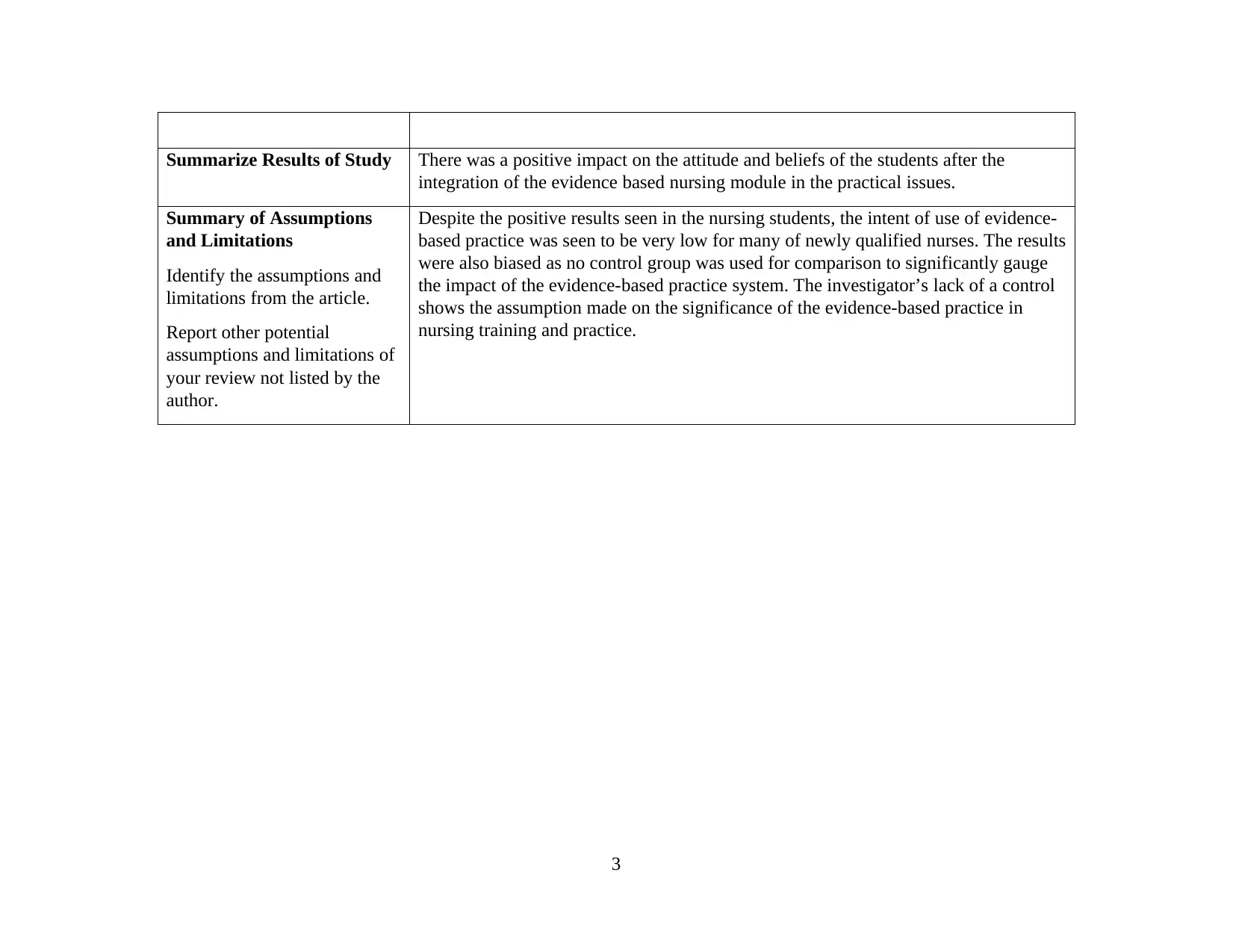
Summarize Results of Study There was a positive impact on the attitude and beliefs of the students after the
integration of the evidence based nursing module in the practical issues.
Summary of Assumptions
and Limitations
Identify the assumptions and
limitations from the article.
Report other potential
assumptions and limitations of
your review not listed by the
author.
Despite the positive results seen in the nursing students, the intent of use of evidence-
based practice was seen to be very low for many of newly qualified nurses. The results
were also biased as no control group was used for comparison to significantly gauge
the impact of the evidence-based practice system. The investigator’s lack of a control
shows the assumption made on the significance of the evidence-based practice in
nursing training and practice.
3
integration of the evidence based nursing module in the practical issues.
Summary of Assumptions
and Limitations
Identify the assumptions and
limitations from the article.
Report other potential
assumptions and limitations of
your review not listed by the
author.
Despite the positive results seen in the nursing students, the intent of use of evidence-
based practice was seen to be very low for many of newly qualified nurses. The results
were also biased as no control group was used for comparison to significantly gauge
the impact of the evidence-based practice system. The investigator’s lack of a control
shows the assumption made on the significance of the evidence-based practice in
nursing training and practice.
3
⊘ This is a preview!⊘
Do you want full access?
Subscribe today to unlock all pages.

Trusted by 1+ million students worldwide
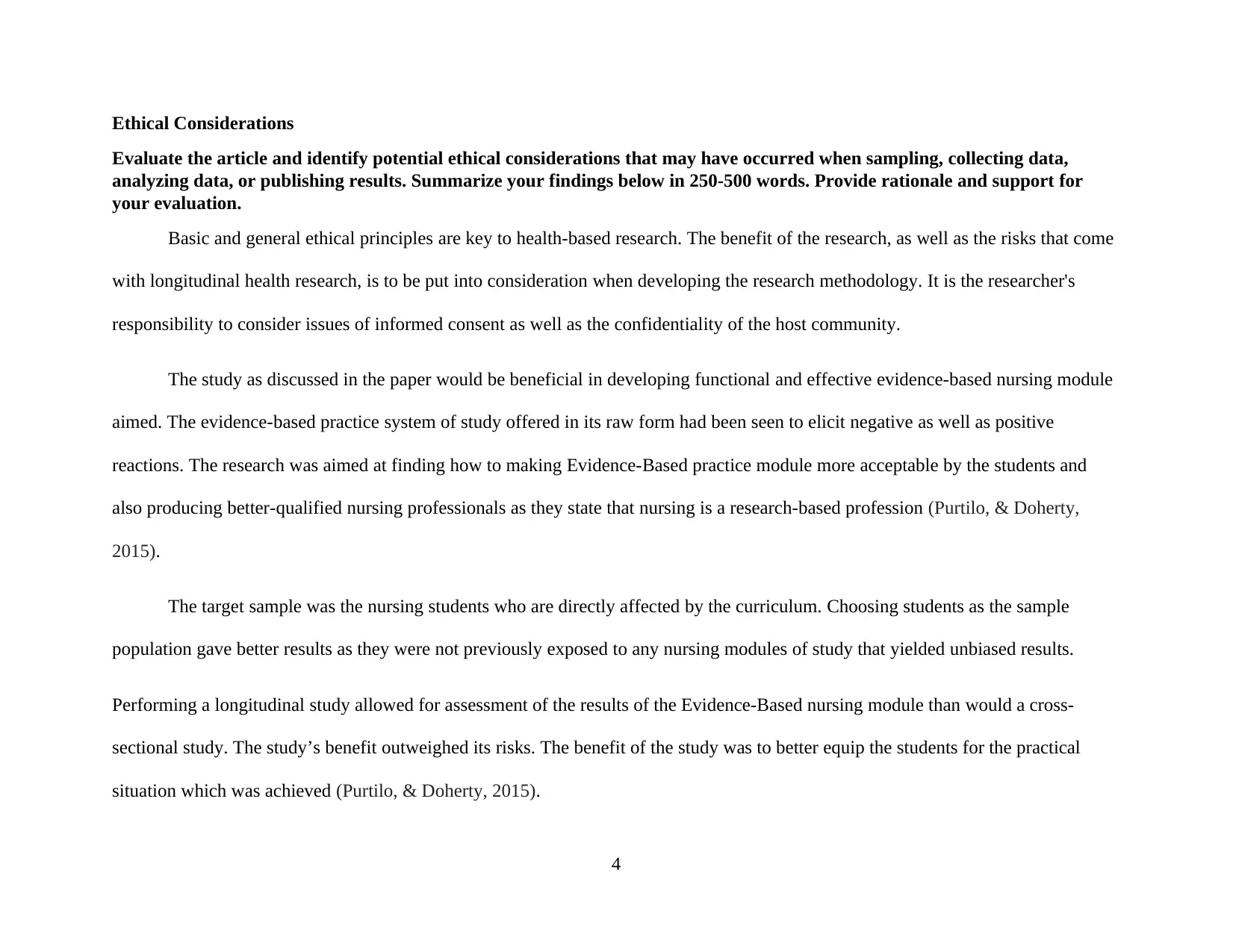
Ethical Considerations
Evaluate the article and identify potential ethical considerations that may have occurred when sampling, collecting data,
analyzing data, or publishing results. Summarize your findings below in 250-500 words. Provide rationale and support for
your evaluation.
Basic and general ethical principles are key to health-based research. The benefit of the research, as well as the risks that come
with longitudinal health research, is to be put into consideration when developing the research methodology. It is the researcher's
responsibility to consider issues of informed consent as well as the confidentiality of the host community.
The study as discussed in the paper would be beneficial in developing functional and effective evidence-based nursing module
aimed. The evidence-based practice system of study offered in its raw form had been seen to elicit negative as well as positive
reactions. The research was aimed at finding how to making Evidence-Based practice module more acceptable by the students and
also producing better-qualified nursing professionals as they state that nursing is a research-based profession (Purtilo, & Doherty,
2015).
The target sample was the nursing students who are directly affected by the curriculum. Choosing students as the sample
population gave better results as they were not previously exposed to any nursing modules of study that yielded unbiased results.
Performing a longitudinal study allowed for assessment of the results of the Evidence-Based nursing module than would a cross-
sectional study. The study’s benefit outweighed its risks. The benefit of the study was to better equip the students for the practical
situation which was achieved (Purtilo, & Doherty, 2015).
4
Evaluate the article and identify potential ethical considerations that may have occurred when sampling, collecting data,
analyzing data, or publishing results. Summarize your findings below in 250-500 words. Provide rationale and support for
your evaluation.
Basic and general ethical principles are key to health-based research. The benefit of the research, as well as the risks that come
with longitudinal health research, is to be put into consideration when developing the research methodology. It is the researcher's
responsibility to consider issues of informed consent as well as the confidentiality of the host community.
The study as discussed in the paper would be beneficial in developing functional and effective evidence-based nursing module
aimed. The evidence-based practice system of study offered in its raw form had been seen to elicit negative as well as positive
reactions. The research was aimed at finding how to making Evidence-Based practice module more acceptable by the students and
also producing better-qualified nursing professionals as they state that nursing is a research-based profession (Purtilo, & Doherty,
2015).
The target sample was the nursing students who are directly affected by the curriculum. Choosing students as the sample
population gave better results as they were not previously exposed to any nursing modules of study that yielded unbiased results.
Performing a longitudinal study allowed for assessment of the results of the Evidence-Based nursing module than would a cross-
sectional study. The study’s benefit outweighed its risks. The benefit of the study was to better equip the students for the practical
situation which was achieved (Purtilo, & Doherty, 2015).
4
Paraphrase This Document
Need a fresh take? Get an instant paraphrase of this document with our AI Paraphraser
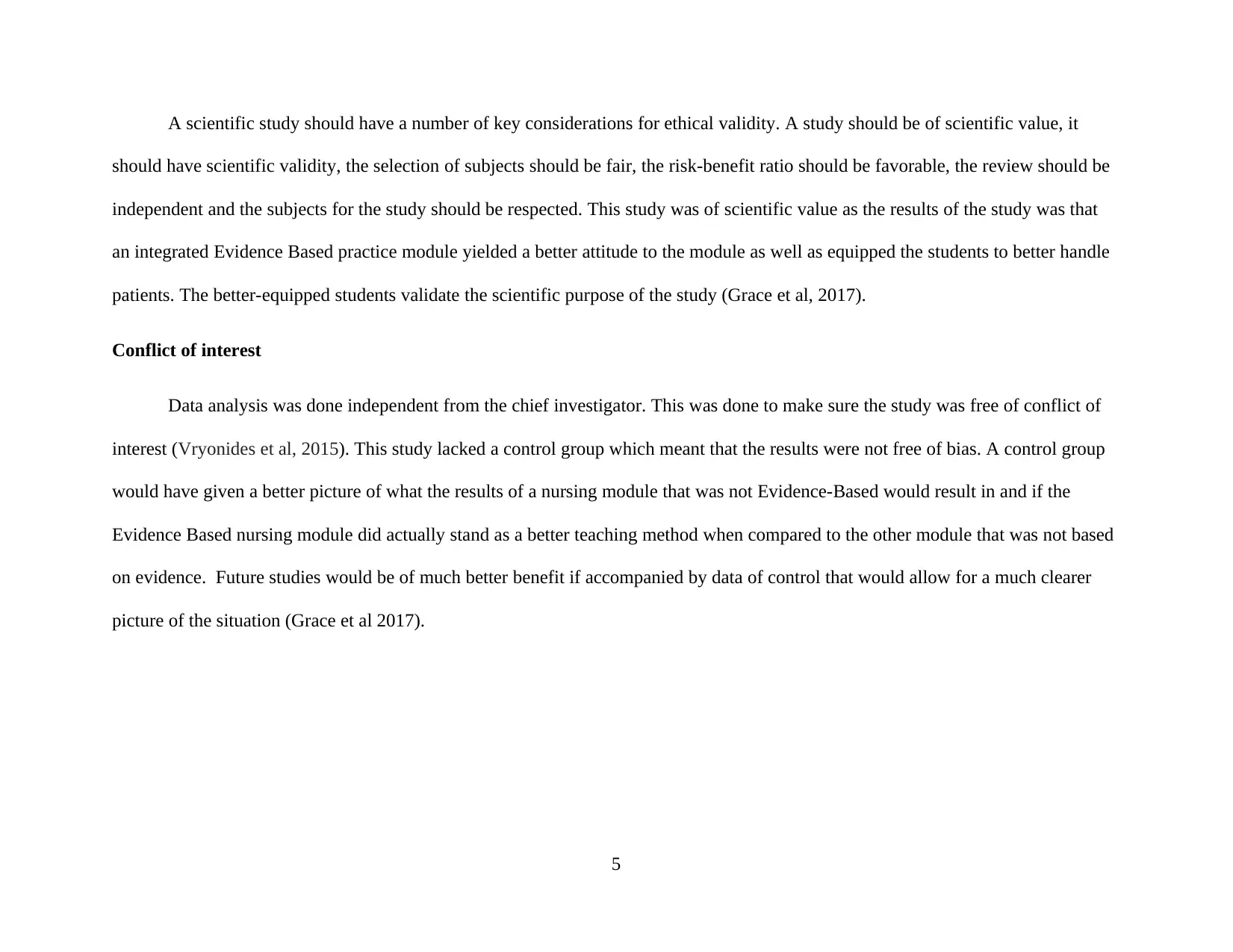
A scientific study should have a number of key considerations for ethical validity. A study should be of scientific value, it
should have scientific validity, the selection of subjects should be fair, the risk-benefit ratio should be favorable, the review should be
independent and the subjects for the study should be respected. This study was of scientific value as the results of the study was that
an integrated Evidence Based practice module yielded a better attitude to the module as well as equipped the students to better handle
patients. The better-equipped students validate the scientific purpose of the study (Grace et al, 2017).
Conflict of interest
Data analysis was done independent from the chief investigator. This was done to make sure the study was free of conflict of
interest (Vryonides et al, 2015). This study lacked a control group which meant that the results were not free of bias. A control group
would have given a better picture of what the results of a nursing module that was not Evidence-Based would result in and if the
Evidence Based nursing module did actually stand as a better teaching method when compared to the other module that was not based
on evidence. Future studies would be of much better benefit if accompanied by data of control that would allow for a much clearer
picture of the situation (Grace et al 2017).
5
should have scientific validity, the selection of subjects should be fair, the risk-benefit ratio should be favorable, the review should be
independent and the subjects for the study should be respected. This study was of scientific value as the results of the study was that
an integrated Evidence Based practice module yielded a better attitude to the module as well as equipped the students to better handle
patients. The better-equipped students validate the scientific purpose of the study (Grace et al, 2017).
Conflict of interest
Data analysis was done independent from the chief investigator. This was done to make sure the study was free of conflict of
interest (Vryonides et al, 2015). This study lacked a control group which meant that the results were not free of bias. A control group
would have given a better picture of what the results of a nursing module that was not Evidence-Based would result in and if the
Evidence Based nursing module did actually stand as a better teaching method when compared to the other module that was not based
on evidence. Future studies would be of much better benefit if accompanied by data of control that would allow for a much clearer
picture of the situation (Grace et al 2017).
5
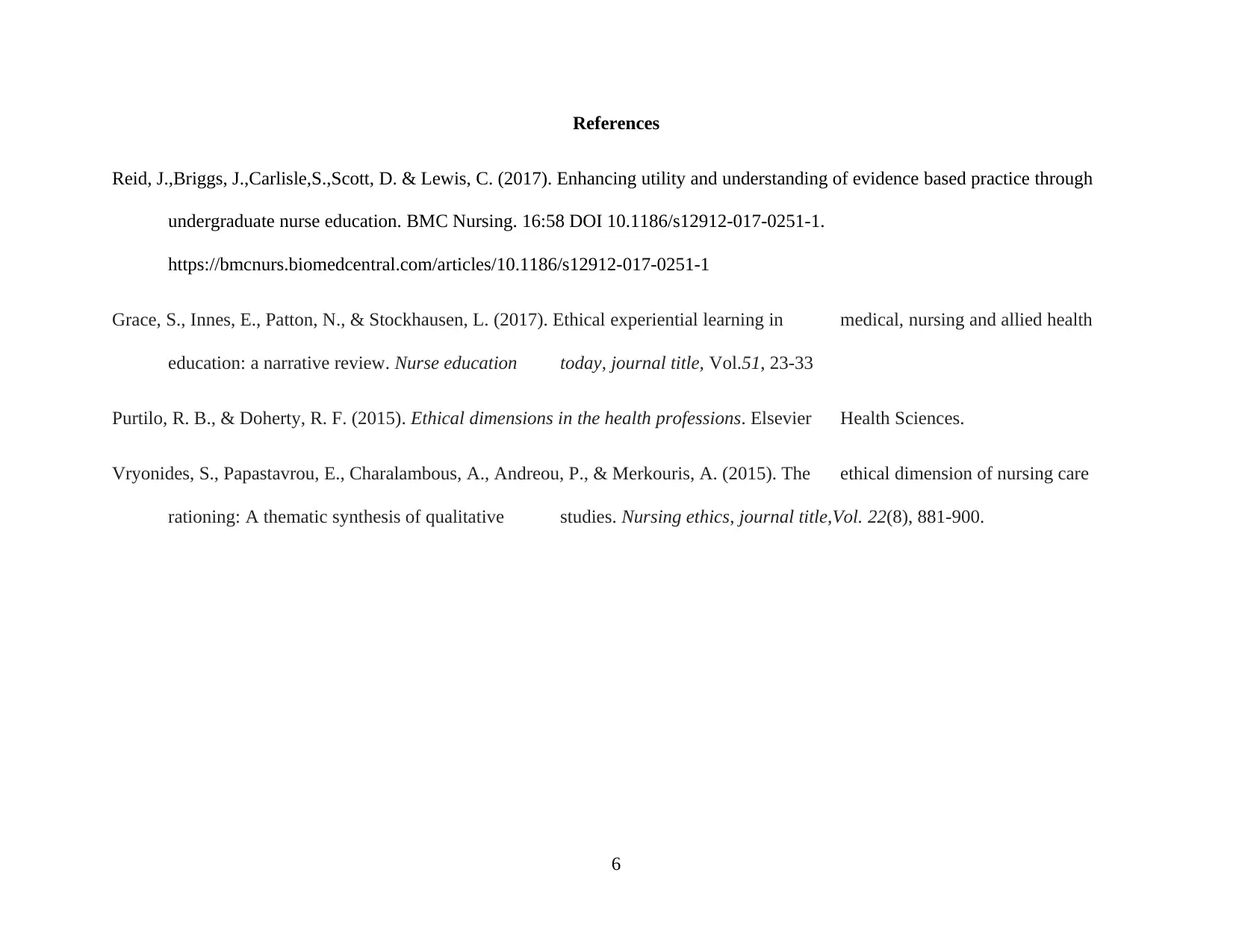
References
Reid, J.,Briggs, J.,Carlisle,S.,Scott, D. & Lewis, C. (2017). Enhancing utility and understanding of evidence based practice through
undergraduate nurse education. BMC Nursing. 16:58 DOI 10.1186/s12912-017-0251-1.
https://bmcnurs.biomedcentral.com/articles/10.1186/s12912-017-0251-1
Grace, S., Innes, E., Patton, N., & Stockhausen, L. (2017). Ethical experiential learning in medical, nursing and allied health
education: a narrative review. Nurse education today, journal title, Vol.51, 23-33
Purtilo, R. B., & Doherty, R. F. (2015). Ethical dimensions in the health professions. Elsevier Health Sciences.
Vryonides, S., Papastavrou, E., Charalambous, A., Andreou, P., & Merkouris, A. (2015). The ethical dimension of nursing care
rationing: A thematic synthesis of qualitative studies. Nursing ethics, journal title,Vol. 22(8), 881-900.
6
Reid, J.,Briggs, J.,Carlisle,S.,Scott, D. & Lewis, C. (2017). Enhancing utility and understanding of evidence based practice through
undergraduate nurse education. BMC Nursing. 16:58 DOI 10.1186/s12912-017-0251-1.
https://bmcnurs.biomedcentral.com/articles/10.1186/s12912-017-0251-1
Grace, S., Innes, E., Patton, N., & Stockhausen, L. (2017). Ethical experiential learning in medical, nursing and allied health
education: a narrative review. Nurse education today, journal title, Vol.51, 23-33
Purtilo, R. B., & Doherty, R. F. (2015). Ethical dimensions in the health professions. Elsevier Health Sciences.
Vryonides, S., Papastavrou, E., Charalambous, A., Andreou, P., & Merkouris, A. (2015). The ethical dimension of nursing care
rationing: A thematic synthesis of qualitative studies. Nursing ethics, journal title,Vol. 22(8), 881-900.
6
⊘ This is a preview!⊘
Do you want full access?
Subscribe today to unlock all pages.

Trusted by 1+ million students worldwide
1 out of 6
Related Documents
Your All-in-One AI-Powered Toolkit for Academic Success.
+13062052269
info@desklib.com
Available 24*7 on WhatsApp / Email
![[object Object]](/_next/static/media/star-bottom.7253800d.svg)
Unlock your academic potential
Copyright © 2020–2025 A2Z Services. All Rights Reserved. Developed and managed by ZUCOL.





